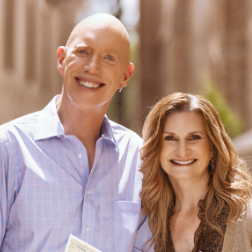Utopia Upended
What happens when your sunny life as an expatriate retiree abroad turns into a hazy shade of winter?
Portugal, once among the most welcoming countries for Americans seeking a warm, sunny and exotic locale to enjoy retirement, is becoming a little less welcoming.

The government recently said it will revoke a special tax status for foreigners who buy property in the country and spend as little as one week a year there. The status, called Non-Habitual Residence, or NHR, allowed expatriates to pay no more than 20% in taxes on income earned in Portugal and no tax on money made abroad. Losing NHR could leave expats to pay the country's graduated tax rates, which peak at 48%.
That news closely followed the government's decision to eliminate so-called Golden Visas, which granted instant residency to foreigners in exchange for a real estate investment of €500,000 or more.
Portugal introduced both of these initiatives to attract money and talent after a prolonged economic slump following the Great Recession of 2008. Now, however, affluent foreigners who moved to Portugal and helped to recharge its economy are being blamed for skyrocketing housing prices.
Wake-Up Call for Expats
While the effectiveness of removing these incentives is arguable, shock waves of uncertainty reverberated through expat communities — and beyond. How would current and prospective foreign residents be affected?
Before the consequences could be fully evaluated, the government announced that the country's Prime Minister had resigned with immediate effect amid a corruption scandal. His entire legislative agenda, including the rescindment of NHR, was being tabled while the situation sorted itself out.
This tumultuous sequence of events serves as an important wake-up call for people who contemplate a life abroad. After conducting exhaustive research on important considerations like climate, cost of living and health care, they zeroed in on the country they want to call home and made the big move.
But now that they are there, what if things change?
Caught Off Guard
Some situations simply cannot be anticipated. As the extreme example of conflicting announcements by the Portuguese government illustrates, regulations in foreign countries can be a constantly moving target.
"Unpredicted increases in the cost of living are a common issue."
While existing residents are often grandfathered from such policy shifts, plans of prospective expats can be scuttled by the sudden dismantlement of a program like the Golden Visa or large increases in minimum income and investment requirements.
COVID caught the entire world unaware, and expats were particularly affected by months of enforced isolation in unfamiliar environments. Once allowed to travel again, many reevaluated the importance of family connection and chose to move closer to loved ones.
"Unpredicted increases in the cost of living are a common issue," says Julie Anderson, chief strategy officer for Global Residence Index, a residence and citizenship consultancy. "A city that was once considered affordable might experience an economic boom and, subsequently, a surge in living expenses."
Pay Attention When Planning
Often, however, potential changes that might derail one's expat experience are hiding in plain sight. The dream of an exotic life abroad can be so intoxicating that it impairs one's judgment about the challenges and future risks.
Here are some of the most common overlooked changes to keep in mind:
- Climate. This seems obvious, but many a new expat ignores the fact that seasons have a whole different meaning in other parts of the world. Travel writer Katie Caf moved to Tulum, Mexico, because “it was close to home, cheap, had a beach and a strong expat community.”
Arriving during the "dry season" in late February, she admittedly failed to anticipate the deluge of rain accompanied by oppressive heat and humidity that envelops Tulum from June through November. "I said, 'No thank you!'" she relates, "and immediately changed my plans to live somewhere with a more moderate climate."
"Initially, everything was enchanting — the culture, the landscapes and the simplicity of island life."
- Currency fluctuations. In recent years, the U.S. dollar has performed well in the international market. For those with an income based in the States, this has made traveling to and living in many foreign countries a fantastic bargain.
Problems arise when your budget is calculated based on the current exchange rate with no cushion in the event conditions change. For example, after a decade of downwardly spiraling value, the Colombian peso has gained 22% versus the U.S. dollar this year.
Digital nomad Kayden Roberts ventured to La Reunion Island off the coast of Africa seeking to blend work with exploration in an idyllic setting. She says, "Initially, everything was enchanting — the culture, the landscapes and the simplicity of island life."
As the months passed, challenges surfaced, among them "fluctuating currency exchange rates, which impacted my earnings and savings more than expected," she says. "As the financial unpredictability grew, I had to make the tough decision to move back to New York City."
"As the financial unpredictability grew, I had to make the tough decision to move back to New York City."
- Safety. Expats, particularly those who move abroad in search of a lower cost of living, may not think of themselves as prosperous. But in countries where the minimum wage is only a few hundred dollars a month, their affluence far exceeds many locals and can make them targets for petty crime.
When she first moved to Thailand, Tiffany McGee, founder of Nomadrs, says the sense of community and the peaceful environment were exactly what she had envisioned. "But as time passed, the atmosphere began to change," she adds.
Reports of safety issues started to rise, even in areas considered expat friendly. When a close friend was mugged by two men on a motorbike, "increasing safety concerns made it clear that relocating was necessary for my well-being," she shares.
Two Keys to Handling Change
The vibe during our 13-plus years living in Cuenca, Ecuador, has often been described as muy tranquilo, a welcome counterpoint to the frazzled energy back home in the United States. Recently, however, the country's peaceful easy feeling has been rocked by drug-related violence on the coast.
El Niño, a climate pattern that happens every three to seven years, is presently causing a drought in the Andes where we reside. Daily two-hour electricity blackouts are currently in place, and water restrictions are being considered.
It is far different to become infatuated with a location during a short stay than living there 24/7/365.
Are we planning a move elsewhere because of these surprising developments? Hardly. In fact, we recently signed a four-year lease on a new apartment.
Isolated events on the coast have no impact on our daily life hundreds of miles away, and temporary minor disruptions in energy consumption do not begin to overshadow the compelling reasons we moved here.
Whether unforeseen or overlooked, change is the one true constant wherever you find yourself. Dealing with its inevitability, successful expats share two key traits:
1. A Strong "Why"
The "expat graveyard" is filled with people who moved abroad because of what we call a vacation mentality. It is far different to become infatuated with a location during a short stay than living there 24/7/365.
Be clear on why you want to live in another country, not basing your reasons on unrealistic expectations that things will always remain the same. Because they won't.
2. Flexibility
Adapting to a different culture and, often, language requires a deep reservoir of patience and resilience. Those traits, honed through navigating sometimes mind-boggling bureaucracy and committing countless faux pas, are vital tools at your disposal when circumstances change.
There is one other variant that can upset the expat apple cart — you. After living abroad for a while, the compelling reasons that launched your journey may not resonate as strongly as they once did. You can tire of feeling like an outsider. The climate does not suit you after all. Those distant grandchildren tug at your heartstrings.
Changing your mind and returning home is never a failure. You have learned more about yourself, and you have had one heck of an adventure!


